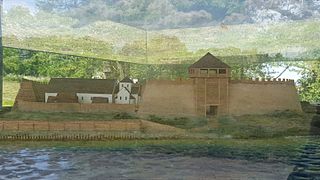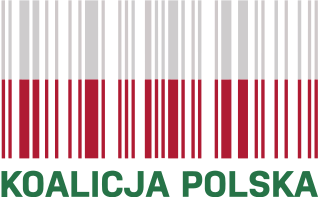The Polish People's Party is an agrarian political party in Poland. It is currently led by Władysław Kosiniak-Kamysz.

Self-Defence of the Republic of Poland is a nationalist, socialist, populist, and agrarian political party and trade union in Poland. The party promotes agrarian socialist and Catholic socialist economic policies combined with a left-wing populist, anti-globalization and anti-neoliberal rhetoric. The party describes itself as left-wing, although it stresses that it belongs to the "patriotic left" and follows Catholic social teaching. The party is sympathetic to Communist Poland, which led political scientists to label the party as neocommunist, post-communist, and far-left.

Law and Justice is a right-wing populist and national-conservative political party in Poland. Its chairman is Jarosław Kaczyński.

Ostrów Lednicki is an island in the southern portion of Lake Lednica in Poland, located between the cities of Gniezno and Poznań. The word ostrów is an archaic Polish word for "holm" - hence in English it is sometimes known as "Lednica Holm".

The Christianization of Poland refers to the introduction and subsequent spread of Christianity in Poland. The impetus to the process was the Baptism of Poland, the personal baptism of Mieszko I, the first ruler of the future Polish state, and much of his court. The ceremony took place on Holy Saturday, 14 April 966, although the exact location is disputed by historians, with the cities of Poznań and Gniezno being the most likely sites. Mieszko's wife, Dobrawa of Bohemia, is often seen as a major influence on Mieszko's decision to accept Christianity.

Right-wing populism, also called national populism and right-wing nationalism, is a political ideology that combines right-wing politics with populist rhetoric and themes. Its rhetoric employs anti-elitist sentiments, opposition to the Establishment, and speaking to or for the "common people". Recurring themes of right-wing populists include neo-nationalism, social conservatism, economic nationalism and fiscal conservatism. Frequently, they aim to defend a national culture, identity, and economy against perceived attacks by outsiders. Right-wing populism has remained the dominant political force in the Republican Party in the United States since the 2010s.
Gazeta Polska is a Polish language pro-United Right right-wing populist to far-right weekly magazine published in Poland.

Polish nationalism is a nationalism which asserted that the Polish people were a nation and which affirmed the cultural unity of Poles. British historian of Poland Norman Davies defines nationalism as "a doctrine ... to create a nation by arousing people's awareness of their nationality, and to mobilize their feelings into a vehicle for political action."

Patriotic Self-Defence was a minor political party in Poland. The party was founded in September 2006 by former members of the Self-Defence of the Republic of Poland, who left the party following an argument with the leader of Self-Defence Andrzej Lepper. The party ran in the 2007 Polish parliamentary election, where it tried to take votes from their former party by using a similar name, logo and political program. Ultimately, the party's electoral lists were only accepted in one electoral district. The party won 0.02% of the nationwide vote. It disbanded in 2013.

Ryszard Janusz Bender was a Polish right-wing politician and historian. He is noted for his characterization of Auschwitz as a "labour camp", attracting allegations of Holocaust denial.
Geneviève Zubrzycki is Professor of Sociology (2003–present) and Director of the Weiser Center for Europe and Eurasia, the Copernicus Center for Polish Studies, and the Center for European Studies at the University of Michigan. She is also affiliated with the Frankel Center for Judaic Studies at the University of Michigan.
Auschwitz Supermarket was the name given to a development plan proposed to be built across the street from the Auschwitz Concentration Camp Museum. For over 60 years, the land directly across the street from the Museum has been an area of warehouses and other industry facilities. In 1995, a plan was proposed to change this area into an area which the museum could better utilize. The developer, Janusz Marszałek, submitted "a proposal for a parking and retail development." This plan, also known as the Maja Development, was fully supported by the museum.
The Piast Concept is a political idea of the Polish state based on its initial territories under the Piast dynasty, containing a mostly Polish population. It holds that Poland, composed of primarily Polish parts in the West during the Middle Ages, was a solid Westernized state and was equal to other Western European countries.

Parliamentary elections were held in Poland on 25 October 2015 for the eighth term of the Sejm and Senate, which ran from 12 November 2015 until 2019.

The New Hope is a right-wing political party in Poland. It is currently led by Sławomir Mentzen.
In political science, the terms radical right, reactionary right and populist right have been used to refer to the range of nationalist, right-wing to far-right parties that have grown in support since the late 1970s in Europe. Populist right groups have shared a number of causes, which typically include opposition to globalisation and immigration, criticism of multiculturalism, and opposition to the European Union, but do not oppose democracy.
Kukiz'15 is a right-wing populist political party in Poland led by Paweł Kukiz.

The Confederation Liberty and Independence, frequently shortened to just Confederation, is a far-right political alliance in Poland. It was initially founded in 2018 as a political coalition for the 2019 European Parliament election in Poland, although it was later expanded into a political party in order to circumvent the 8% vote threshold for coalitions to enter the national parliament. It won 11 seats in the Sejm after the 2019 Polish parliamentary election. Its candidate for the 2020 Polish presidential election was Krzysztof Bosak, who placed fourth among eleven candidates.
Rafał Pankowski is a Polish sociologist and political scientist. Pankowski is a Phd and associate professor at Collegium Civitas, as well as the head of "Never Again" Association's East Europe Monitoring Center. He is also the deputy editor of Never Again's magazine. He is also involved in monitoring football hooliganism as part of UEFA's Fare network.

The Polish Coalition is a political alliance in Poland. It is led by the Polish People's Party.













